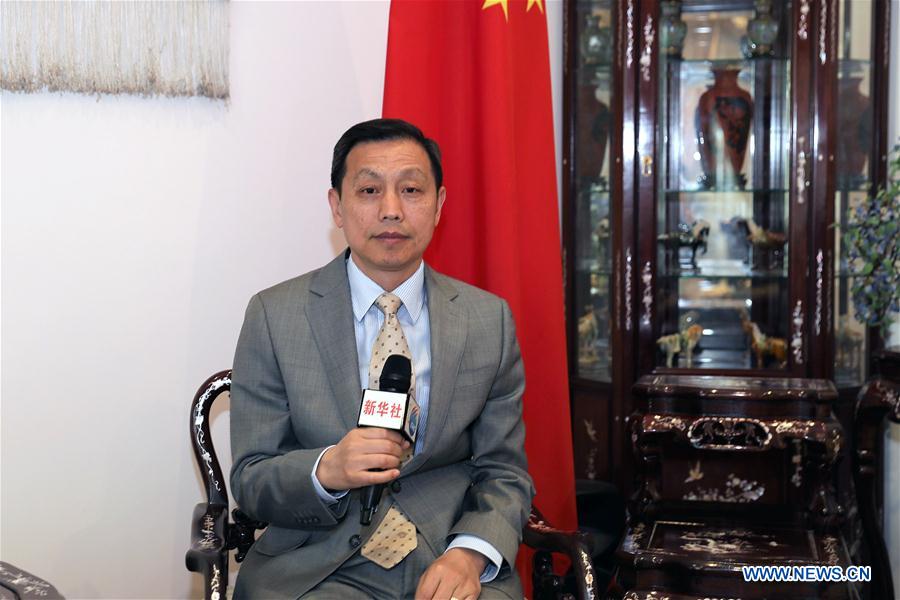China-Kuwait cooperation enters fast tracks under BRI: Chinese envoy
The cooperation between China and Kuwait has entered a period of fast development under the framework of Belt and Road Initiative (BRI), Chinese Ambassador to Kuwait Li Minggang said in a recent interview with Xinhua.
The cooperation between China and Kuwait has entered a period of fast development under the framework of Belt and Road Initiative (BRI), Chinese Ambassador to Kuwait Li Minggang said in a recent interview with Xinhua.

Chinese Ambassador to Kuwait Li Minggang is seen in an interview with Xinhua in Kuwait City, Kuwait, on April 24, 2019. [Photo/Xinhua]
Kuwait was the first Gulf country to establish diplomatic relations with China and it was also one of the first Arab countries to sign a cooperation agreement with China under the BRI, the ambassador said.
The Kuwaiti side has decided to integrate the China-proposed initiative with the "Kuwait 2035," a national development strategy of Kuwait, Li noted, adding that this will put the China-Kuwait cooperation on fast track.
The initiative is highly compatible with the "Kuwait 2035," the ambassador stressed.
Proposed by China in 2013, the BRI refers to the Silk Road Economic Belt and the 21st Century Maritime Silk Road, and aims to build a trade and infrastructure network connecting Asia with Europe and Africa through the ancient trade routes of the Silk Road.
In February 2010, with an aim to change the country's traditional oil-reliant economic structure, the Kuwaiti government unveiled "Kuwait 2035," a national development strategy to turn the country into a trade and financial hub.
In 2015, the Kuwaiti government announced plans to develop five islands off the eastern coast of the country into free trade zones.
"Like Kuwaiti First Deputy Prime Minister and Defense Minister Sheikh Nasser Sabah Al-Ahmad Al-Sabah said, China is a strategic partner of Kuwait's project 'Silk City and Five Islands'," the ambassador added.
China is willing to share with Kuwait its experience in construction of industrial park and free trade zone and contribute to the planning, construction and operation of the "Silk City and Five Islands," Li said.
"We are ready to use Chinese wisdom to help the Kuwaiti people in pursuit of a better life," he added.
As of the strategic partnership between China and Kuwait, Li said that this partnership reflects the great potential and strong will of the two countries to strengthen cooperation.
In July last year, China and Kuwait agreed to establish strategic partnership between the two countries to inject new impetus into bilateral ties and open up new prospects in the new era.
"The partnership will guide and guarantee further development of bilateral relations at a higher level and promise more achievements in cooperation," Li noted.
Currently, the primary goal of Kuwait's national economic development is developing non-oil industries, promoting industrial restructure, and achieving economic diversification.
"China has high-quality production capacity and mature technology. It can help Kuwait to accelerate its industrialization process," he said, adding that the two sides could fully complement each other and deepen pragmatic cooperation in various fields.
"People-to-people exchanges is a key factor to consolidate foundation of relations between the two countries," Li said, adding that "the two governments have been actively engaging in visa issues to facilitate personnel exchanges."
"Through these efforts, we hope that our Kuwaiti friends could truly understand China and become witnesses, participants and beneficiaries of China-Kuwait friendly cooperation," Li stressed.
"We are prepared to continuously cultivate new growth points for economic and trade cooperation, expand pragmatic cooperation in various fields, and implement the important consensus reached by the leaders of the two countries," Li said.
"We believe that, in the future, the two countries will make greater progress in pragmatic cooperation under the BRI," he added.
Speaking of the second Belt and Road Forum for International Cooperation, Li said that the forum will provide opportunities for more countries to understand the China-proposed initiative.
"We hope that more countries will join the construction of the BRI, thus bringing more tangible benefits to countries along the route," Li added.

